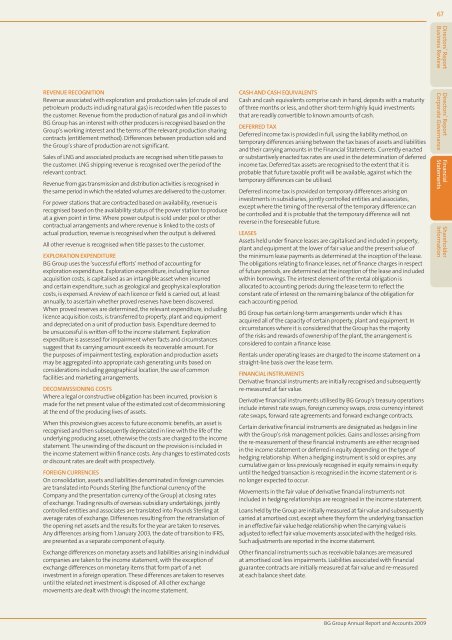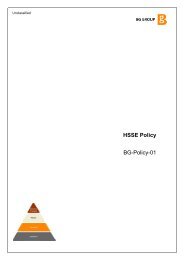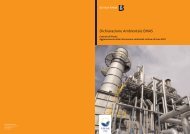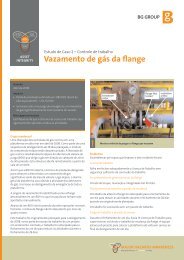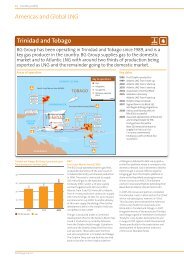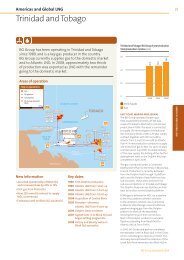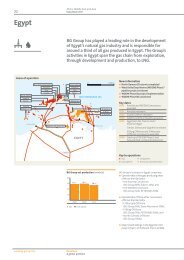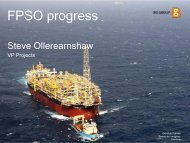Annual Report and Accounts 2009 - BG Group
Annual Report and Accounts 2009 - BG Group
Annual Report and Accounts 2009 - BG Group
Create successful ePaper yourself
Turn your PDF publications into a flip-book with our unique Google optimized e-Paper software.
REVENUE RECOGNITION<br />
Revenue associated with exploration <strong>and</strong> production sales (of crude oil <strong>and</strong><br />
petroleum products including natural gas) is recorded when title passes to<br />
the customer. Revenue from the production of natural gas <strong>and</strong> oil in which<br />
<strong>BG</strong> <strong>Group</strong> has an interest with other producers is recognised based on the<br />
<strong>Group</strong>’s working interest <strong>and</strong> the terms of the relevant production sharing<br />
contracts (entitlement method). Differences between production sold <strong>and</strong><br />
the <strong>Group</strong>’s share of production are not significant.<br />
Sales of LNG <strong>and</strong> associated products are recognised when title passes to<br />
the customer. LNG shipping revenue is recognised over the period of the<br />
relevant contract.<br />
Revenue from gas transmission <strong>and</strong> distribution activities is recognised in<br />
the same period in which the related volumes are delivered to the customer.<br />
For power stations that are contracted based on availability, revenue is<br />
recognised based on the availability status of the power station to produce<br />
at a given point in time. Where power output is sold under pool or other<br />
contractual arrangements <strong>and</strong> where revenue is linked to the costs of<br />
actual production, revenue is recognised when the output is delivered.<br />
All other revenue is recognised when title passes to the customer.<br />
EXPLORATION EXPENDITURE<br />
<strong>BG</strong> <strong>Group</strong> uses the ‘successful efforts’ method of accounting for<br />
exploration expenditure. Exploration expenditure, including licence<br />
acquisition costs, is capitalised as an intangible asset when incurred<br />
<strong>and</strong> certain expenditure, such as geological <strong>and</strong> geophysical exploration<br />
costs, is expensed. A review of each licence or field is carried out, at least<br />
annually, to ascertain whether proved reserves have been discovered.<br />
When proved reserves are determined, the relevant expenditure, including<br />
licence acquisition costs, is transferred to property, plant <strong>and</strong> equipment<br />
<strong>and</strong> depreciated on a unit of production basis. Expenditure deemed to<br />
be unsuccessful is written-off to the income statement. Exploration<br />
expenditure is assessed for impairment when facts <strong>and</strong> circumstances<br />
suggest that its carrying amount exceeds its recoverable amount. For<br />
the purposes of impairment testing, exploration <strong>and</strong> production assets<br />
may be aggregated into appropriate cash generating units based on<br />
considerations including geographical location, the use of common<br />
facilities <strong>and</strong> marketing arrangements.<br />
DECOMMISSIONING COSTS<br />
Where a legal or constructive obligation has been incurred, provision is<br />
made for the net present value of the estimated cost of decommissioning<br />
at the end of the producing lives of assets.<br />
When this provision gives access to future economic benefits, an asset is<br />
recognised <strong>and</strong> then subsequently depreciated in line with the life of the<br />
underlying producing asset, otherwise the costs are charged to the income<br />
statement. The unwinding of the discount on the provision is included in<br />
the income statement within finance costs. Any changes to estimated costs<br />
or discount rates are dealt with prospectively.<br />
FOREIGN CURRENCIES<br />
On consolidation, assets <strong>and</strong> liabilities denominated in foreign currencies<br />
are translated into Pounds Sterling (the functional currency of the<br />
Company <strong>and</strong> the presentation currency of the <strong>Group</strong>) at closing rates<br />
of exchange. Trading results of overseas subsidiary undertakings, jointly<br />
controlled entities <strong>and</strong> associates are translated into Pounds Sterling at<br />
average rates of exchange. Differences resulting from the retranslation of<br />
the opening net assets <strong>and</strong> the results for the year are taken to reserves.<br />
Any differences arising from 1 January 2003, the date of transition to IFRS,<br />
are presented as a separate component of equity.<br />
Exchange differences on monetary assets <strong>and</strong> liabilities arising in individual<br />
companies are taken to the income statement, with the exception of<br />
exchange differences on monetary items that form part of a net<br />
investment in a foreign operation. These differences are taken to reserves<br />
until the related net investment is disposed of. All other exchange<br />
movements are dealt with through the income statement.<br />
CASH AND CASH EQUIVALENTS<br />
Cash <strong>and</strong> cash equivalents comprise cash in h<strong>and</strong>, deposits with a maturity<br />
of three months or less, <strong>and</strong> other short-term highly liquid investments<br />
that are readily convertible to known amounts of cash.<br />
DEFERRED TAX<br />
Deferred income tax is provided in full, using the liability method, on<br />
temporary differences arising between the tax bases of assets <strong>and</strong> liabilities<br />
<strong>and</strong> their carrying amounts in the Financial Statements. Currently enacted<br />
or substantively enacted tax rates are used in the determination of deferred<br />
income tax. Deferred tax assets are recognised to the extent that it is<br />
probable that future taxable profit will be available, against which the<br />
temporary differences can be utilised.<br />
Deferred income tax is provided on temporary differences arising on<br />
investments in subsidiaries, jointly controlled entities <strong>and</strong> associates,<br />
except where the timing of the reversal of the temporary difference can<br />
be controlled <strong>and</strong> it is probable that the temporary difference will not<br />
reverse in the foreseeable future.<br />
LEASES<br />
Assets held under finance leases are capitalised <strong>and</strong> included in property,<br />
plant <strong>and</strong> equipment at the lower of fair value <strong>and</strong> the present value of<br />
the minimum lease payments as determined at the inception of the lease.<br />
The obligations relating to finance leases, net of finance charges in respect<br />
of future periods, are determined at the inception of the lease <strong>and</strong> included<br />
within borrowings. The interest element of the rental obligation is<br />
allocated to accounting periods during the lease term to reflect the<br />
constant rate of interest on the remaining balance of the obligation for<br />
each accounting period.<br />
<strong>BG</strong> <strong>Group</strong> has certain long-term arrangements under which it has<br />
acquired all of the capacity of certain property, plant <strong>and</strong> equipment. In<br />
circumstances where it is considered that the <strong>Group</strong> has the majority<br />
of the risks <strong>and</strong> rewards of ownership of the plant, the arrangement is<br />
considered to contain a finance lease.<br />
Rentals under operating leases are charged to the income statement on a<br />
straight-line basis over the lease term.<br />
FINANCIAL INSTRUMENTS<br />
Derivative financial instruments are initially recognised <strong>and</strong> subsequently<br />
re-measured at fair value.<br />
Derivative financial instruments utilised by <strong>BG</strong> <strong>Group</strong>’s treasury operations<br />
include interest rate swaps, foreign currency swaps, cross currency interest<br />
rate swaps, forward rate agreements <strong>and</strong> forward exchange contracts.<br />
Certain derivative financial instruments are designated as hedges in line<br />
with the <strong>Group</strong>’s risk management policies. Gains <strong>and</strong> losses arising from<br />
the re-measurement of these financial instruments are either recognised<br />
in the income statement or deferred in equity depending on the type of<br />
hedging relationship. When a hedging instrument is sold or expires, any<br />
cumulative gain or loss previously recognised in equity remains in equity<br />
until the hedged transaction is recognised in the income statement or is<br />
no longer expected to occur.<br />
Movements in the fair value of derivative financial instruments not<br />
included in hedging relationships are recognised in the income statement.<br />
Loans held by the <strong>Group</strong> are initially measured at fair value <strong>and</strong> subsequently<br />
carried at amortised cost, except where they form the underlying transaction<br />
in an effective fair value hedge relationship when the carrying value is<br />
adjusted to reflect fair value movements associated with the hedged risks.<br />
Such adjustments are reported in the income statement.<br />
Other financial instruments such as receivable balances are measured<br />
at amortised cost less impairments. Liabilities associated with financial<br />
guarantee contracts are initially measured at fair value <strong>and</strong> re-measured<br />
at each balance sheet date.<br />
<strong>BG</strong> <strong>Group</strong> <strong>Annual</strong> <strong>Report</strong> <strong>and</strong> <strong>Accounts</strong> <strong>2009</strong><br />
67<br />
Directors’ <strong>Report</strong><br />
Business Review<br />
Directors’ <strong>Report</strong><br />
Corporate Governance<br />
Financial<br />
Statements<br />
Shareholder<br />
Information


